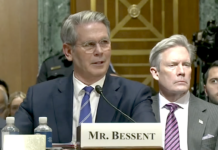
The COVID-19 pandemic in Georgia cost thousands of lives in 2020, put more than 1 million people out of work during a miserable April, pushed health care workers to the brink and changed everyone’s daily life this year and for the foreseeable future.
The public health crisis rippled into Georgia politics, including a historic presidential election where a record-breaking number of voters cast early and absentee ballots to avoid interacting with people at a polling station.
The never-ending election season featured hours-long waits during the June 9 primary, multiple recounts of the presidential results from Nov. 3 and an unprecedented pair of U.S. Senate runoffs set for Jan.5 with potential Democratic control of the federal government on the line.
The pandemic and historic election vied for attention with a new clamor for social justice that opened the decade as new evidence of violence against Black people sent protesters to the streets to demand legal equity.
Below is a recap from the Georgia Recorder of the most memorable milestones in an unforgettable 2020.
Covid-19 Pandemic
The reality of the pandemic dawned on most Georgians in mid-March when sporting events like Atlanta’s NCAA basketball championship was canceled and the Georgia Legislature abruptly headed home well before the calendar predicted. In early April, a growing number of COVID-19 cases prompted the governor to order a statewide closure of schools and left health care providers bracing for a spike in hospitalizations – and deaths.
Georgia’s first severe outbreak was tied to people who attended a funeral in Dougherty County, which soon became one of the nation’s COVID-19 hotspots. Since March, more than 558,000 Georgians have tested positive for COVID and nearly 10,000 coronavirus-related deaths have been reported by the state health department.
A spike in infected patients after the Memorial Day holiday weekend overwhelmed many hospitals and the governor enlisted the Georgia National Guard set up makeshift hospitals to handle the sick people.
President Donald Trump joined a host of critics blasting Kemp’s handling of the pandemic after the governor started lifting restrictions on the state’s businesses by prioritizing barbershops and tattoo parlors.
The governor exchanged a war of words with Georgia’s Democratic mayors in Atlanta, Savannah and elsewhere when their cities passed laws requiring people to wear masks in public.
This month, doses of COVID-19 vaccines trickled into Georgia just as a surge in new cases followed Thanksgiving gatherings of family and friends.
Presidential election and GOP feuds
The coarsening political discourse since Trump’s election in 2016 was likely motivation for many Georgians to help set a record for voter turnout in 2020 when about 5 million people cast ballots in the Nov. 3 election.
It wasn’t until the weekend following the election, but the Associated Press eventuallycalled the race for President-elect Joe Biden, who won by about 12,000 votes. Trump became the first Republican presidential candidate to lose Georgia since 1992.
Trump and many of his allies, including some of Georgia’s high-ranking statewide elected officials, have since launched baseless accusations of voter fraud and filed lawsuits that were dismissed or dropped.

The persistent accusations and conspiracy theories prompted GOP Secretary of State Brad Raffensperger to angrily defend the integrity of the state’s election system and reject calls for his resignation from within his own party.
Two recounts of ballots confirming Biden’s victory did little to sooth tensions as state GOP lawmakers held election hearings, protesters clashed near the Capitol, and lawsuits clogged Georgia courts.
In January, when the state Legislature convenes, Republican leaders promise to make it harder to vote absentee and introduce other changes to voting rules they believe contributed to Trump’s loss.
Twin Senate runoffs
Georgia’s chance to decide control of the Senate and potentially hand control of the federal government to Democrats is unprecedented and a dramatic way to start 2021.
Hundreds of millions of dollars and high-wattage VIPs are pouring into Georgia in the contest between Republican U.S. Sens. David Perdue and Kelly Loeffler, and Democrats Jon Ossoff and Rev. Raphael Warnock.
If both Democrats emerge victorious, then that will give Vice President-elect Kamala Harris the deciding vote in the U.S. Senate, with Democrats controlling Congress and the White House.
Because of the high stakes, Trump, Biden, Vice-President Mike Pence and Harris are among the political VIPs stopping by Georgia at year’s end to rally their political base to turn out for typically sleepy runoffs.
The two sides have proclaimed it a fight for the future of the nation. The Republican senators say the runoffs are a battle for conservative values against the radical socialism of their opponents. Democrats say their Republican counterparts prioritized their pocketbooks with stock sales early in the year instead of alerting the public to the looming danger of COVID-19.
Social justice
A video of the February death of Ahmaud Arbery was released on social media in May. The shocking footage of a Black man being chased down a Brunswick-area street by white men before being shot to death sparked protests and eventually the passing of a historic hate crimes law in Georgia.
Arbery’s killing prompted Georgia Republican House Speaker David Ralston to call on the Senate to act on a hate crime bill that had stalled the year before.
The signing of the hate crimes law was hailed by many lawmakers as a milestone in Georgia’s recognition of past sins.

Arbery’s death and in the initial refusal from local prosecutors to charge his pursuers with his killing, became a rallying cry as people across Georgia and the world became increasingly outraged at violence against Black people, reaching a fever pitch when a Minneapolis police officer knelt on the neck of George Floyd until he died.
When peaceful late spring protests in Atlanta devolved into nighttime rioting, Kemp called in the National Guard to protect property in Atlanta.
Three men now sit in the Glynn County jail, charged with Arbery’s killing.
This article appears in partnership with Georgia Recorder







